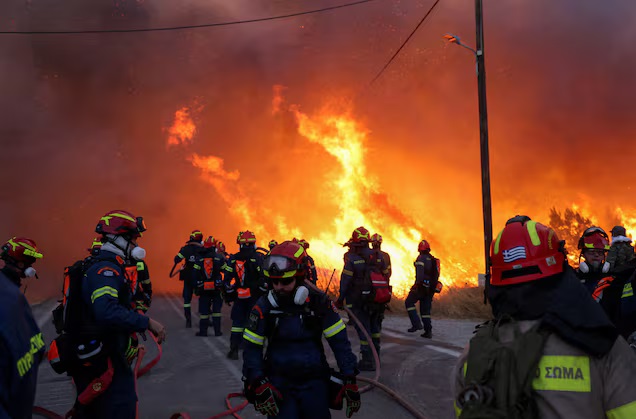
Sustainable Switch: Extreme heat hits US, Greece and Britain
Summer has only just begun across the Northern Hemisphere, and Canada and Greece have already had to battle fierce wildfires, while the United States prepares for extreme temperatures caused by a heat dome over the U.S. Plains.
This week, hundreds of firefighters have been struggling to contain wildfires at several locations on the Greek island of Chios for a third day after the island declared a state of emergency.
Britain has also been experiencing a heat wave, and a rapid analysis by a team of UK scientists found that the extreme heat could result in hundreds of deaths. Separately, a report by the UK Met Office found that extreme heat was now 10 times more likely to happen as it was decades ago.
Earlier this month, smoke from Canada’s burning forests in its eastern provinces reached the U.S. East Coast. The fires have engulfed 3.7 million hectares (9.14 mln acres)of land so far, the second-largest area for this time of year in decades after 2023, federal officials said.
Over in the U.S., potentially dangerous temperatures of 105 degrees Fahrenheit (40 degrees Celsius) and above are expected this weekend in parts of the Midwest, including Chicago, before spreading to the Ohio Valley and much of the East Coast towards the start of next week, according to the National Weather Service.
Eight aircraft and 444 firefighters have been deployed to the Greek island of Chios in the northeastern Aegean Sea to tackle the fires that have torn through swathes of forest and agricultural land, forcing hundreds of villagers to evacuate in recent days.
Chios is in the midst of the tourist season, and authorities also want to prevent the fires from reaching areas famous for producing mastiha, a natural resin harvested from mastic trees.
Authorities issued a new alert
, opens new tab on Tuesday, advising residents of a seaside village southwest of Chios town, the island's capital, to leave as white smoke rose over a nearby beach. Livestream from Greece's public broadcaster showed a helicopter spraying water over the area.
"A lot of work is still needed to bring the wildfires under control," a Greek fire brigade official told Reuters. Northerly winds were complicating firefighting efforts, they added.
Over in the United States, major cities across the U.S. Plains have been preparing for extreme temperatures caused by a heat dome. But what exactly is a heat dome?
Well, a heat dome is a ridge of high-pressure air in the upper atmosphere that stalls and traps hot air, while keeping cooler air away even at night.
In preparation, Chicago is opening cooling centers across the city, Mayor Brandon Johnson told a news conference. City workers are also checking on people living in homeless camps, urging them to go to a cooling center.
"Chicago knows better than any other city in America of the danger of extreme weather, particularly extreme heat," said Johnson, referring to the upcoming 30th anniversary of a heat wave that killed 700 Chicagoans.
New York City Mayor Eric Adams urged residents to locate their nearest cooling center, while the city was working to expand their network and distribute safety information to vulnerable residents.
Heat advisories were already in effect across cities in Colorado, Nebraska and Kansas on Friday, with temperatures in Denver, Colorado, expected to rise to 100 degrees Fahrenheit by 3 p.m.
Health experts urged employers to adjust working hours for outdoor laborers, to ensure they had adequate breaks and opportunities for hydration, and to monitor for signs of heat stroke or exhaustion.
Keeping people cool is likely to be a much bigger drain on electricity grids and a more pressing power sector challenge than demand from data centres and artificial intelligence, writes Reuters global energy transition columnist Gavin Maguire.
Worldwide, data centres and air conditioners are both projected to triple their electricity use over the coming decade and will severely test utilities that are already under strain from aging grids and lengthy backlogs for new supply.








